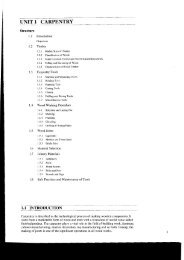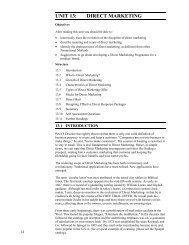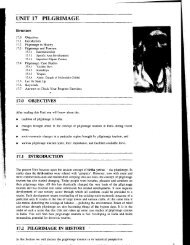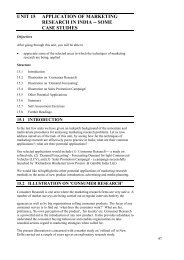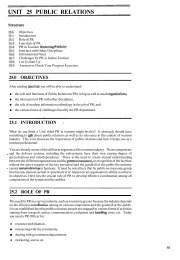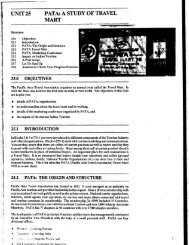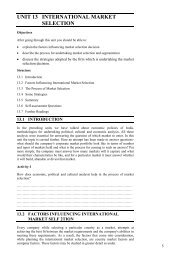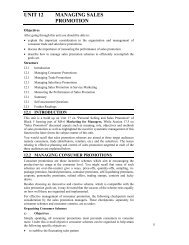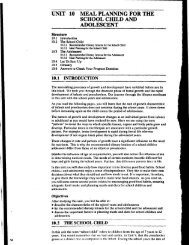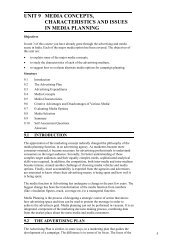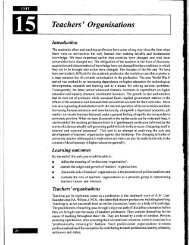UNIT 4 TOURISM AND CULTURE : SOME VIEWS - eGyanKosh
UNIT 4 TOURISM AND CULTURE : SOME VIEWS - eGyanKosh
UNIT 4 TOURISM AND CULTURE : SOME VIEWS - eGyanKosh
You also want an ePaper? Increase the reach of your titles
YUMPU automatically turns print PDFs into web optimized ePapers that Google loves.
In(roducing Indin of economic parameters such as the quantum of foreign exchange earned. Tourism policy<br />
must be developed with greater consideration for ground realities and its impact on local<br />
cultures. It needs to be formulated by interdisciplinary teams of social scientists - including<br />
economists and marketing strategists, rather than the present team of generalist<br />
administrators relying on 'foreign' expertise.<br />
"It is on account of such 'foreign' expertise that India's tourism policy reacts to foreign<br />
demand rather than cater to indigenous needs. It is 'demanded', and strategists seek to<br />
emulate 'foreign' models to meet this demand. The models they have in mind are such<br />
'successes' like the beach resorts of Bali or Thailand, and of course, Disneyland.<br />
Unfortunately, this overt bias to follow foreign models substitutes as tourism policy.<br />
"This process of servicing foreign needs on their terms recreates old colonial structures in the<br />
relationship between the visitor and the host community. ... Culturally loaded images are<br />
casually used in tourism promotion literature to entice foreign tourists: Rajasthan is 'martial',<br />
Khajuraho is 'romantic' and Goa is 'fun, frolic, festivals and fen?. The tragedy that such<br />
insensitivity can result in is evident in the state of the tourism industry of South East Asia - a<br />
'success' at a financial level, but an unmitigated disaster at the social and cultural level."<br />
r<br />
Check Your Progress-2<br />
1) How has tourism affected the life of the local people of Kovalam ?<br />
2) What is the basic dilemma faced by cultural tourism in India?<br />
4.4 LET US SUM UP<br />
The process of cultural exchange supposed to occur with the tourist interaction with the host<br />
communities has failed to take off. This failure is now being clearly recognised the world over.<br />
Reasons for this are many. Firstly, the lack of sufficient time at the disposal of the tourists<br />
hardly provides them the opportunity for an in-depth knowledge of the local culture. Nor can<br />
the locals interact with them fruitfully and understand them. Secondly, the economic<br />
consideration creates a misunderstanding. The locals may think that the tourist is a miser<br />
while the tourists may find the locals too greedy. Such a misunderstanding rules out any<br />
effective cultural interaction. Thirdly, the marketing of imitation cultural productsin the form<br />
of tourist- oriented staged festivals etc. effectively debars the tourists from the knowledge of<br />
genuine local cultures. The locals, in any case, have no means by which they can get to know<br />
the authentic culture of the tourists. Fourthly, the intervention of the middlemen at various<br />
levels creates barriers between the tourists and the locals. The lack of knowledge of each<br />
other's language also contributes to this.



